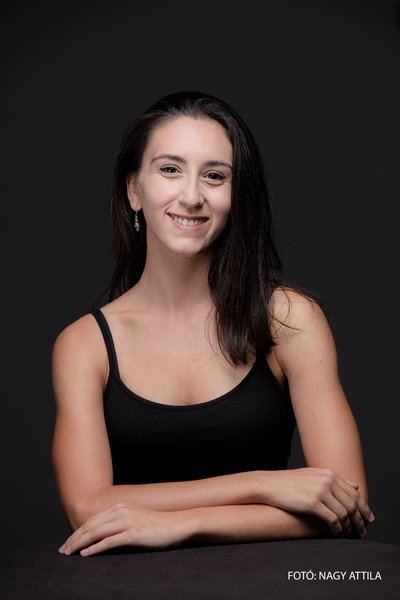Member of the Hungarian national ballet since: 2021
School education:
Conservatorio Profesional de Danza Carmen Amaya, Madrid (2010–2017)
Professional work experience:
New English Ballet Theatre, London (2020)
Main roles:
Eagling/Solymosi/Tchaikovsky: The Nutcracker – Spanish dance, Snowflakes, Waltz of Flowers
Kylián/Mozart: Six dances – First girl, Megastar
Eifman/Strauss II: The Pygmalion Effect – Main kurtizan, Ballroom competition 1st couple
Lavrovsky/Adam: Giselle – Friends of Giselle
Seregi/Goldmark: The Taming of the Shrew – Maid
Petipa/Fadeyechev/Minkus: Don Quixote – Pas de six, Seguedilla
Ekman/Haydn/Beethoven/Schubert: Cacti
Lukács/Glass: Whirling
Vainonen/Messerer/Asafiev: The Flames of Paris – Auvergneiek, Farandola
Ekman/Karlsson/Satie/Brun: Episode 31
Venekei/Dés: A Streetcar Named Desire
MacMillan/Liszt/Lanchbery: Mayerling
Cranko/Tchaikovsky/Stolze: Onegin – Polinaise
Lander/Czerny/Riisager: Etudes
School education:
Conservatorio Profesional de Danza Carmen Amaya, Madrid (2010–2017)
Professional work experience:
New English Ballet Theatre, London (2020)
Main roles:
Eagling/Solymosi/Tchaikovsky: The Nutcracker – Spanish dance, Snowflakes, Waltz of Flowers
Kylián/Mozart: Six dances – First girl, Megastar
Eifman/Strauss II: The Pygmalion Effect – Main kurtizan, Ballroom competition 1st couple
Lavrovsky/Adam: Giselle – Friends of Giselle
Seregi/Goldmark: The Taming of the Shrew – Maid
Petipa/Fadeyechev/Minkus: Don Quixote – Pas de six, Seguedilla
Ekman/Haydn/Beethoven/Schubert: Cacti
Lukács/Glass: Whirling
Vainonen/Messerer/Asafiev: The Flames of Paris – Auvergneiek, Farandola
Ekman/Karlsson/Satie/Brun: Episode 31
Venekei/Dés: A Streetcar Named Desire
MacMillan/Liszt/Lanchbery: Mayerling
Cranko/Tchaikovsky/Stolze: Onegin – Polinaise
Lander/Czerny/Riisager: Etudes
